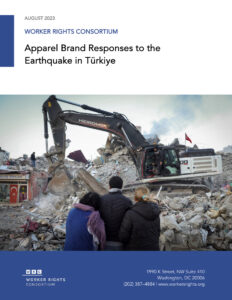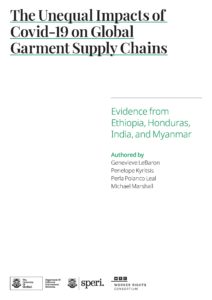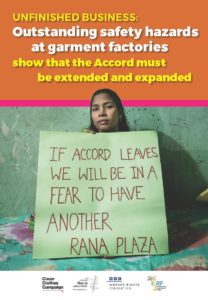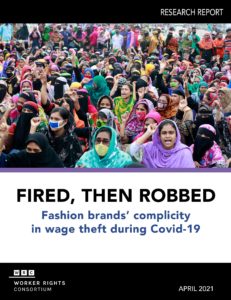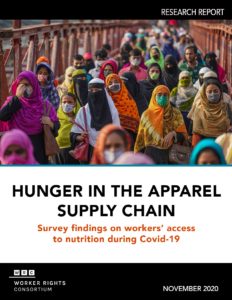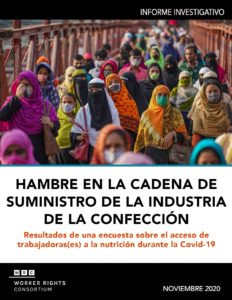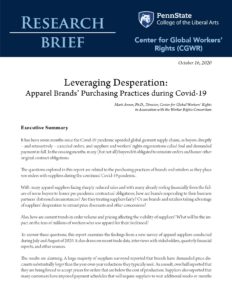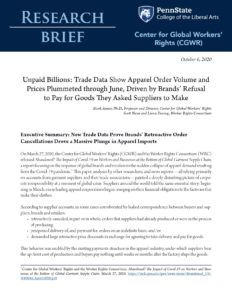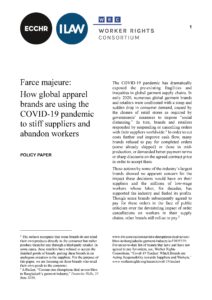Backsliding Toward Disaster?
Under the Bangladesh Accord, now the International Accord, garment factories in Bangladesh have made vast safety improvements since 2013, saving thousands of workers from injury or death. These gains are now under threat.
Read MoreThis white paper evaluates the responses of 16 major apparel brands to the February 6, 2023, earthquake in Türkiye and to its impact on the suppliers and workers in the region producing goods for these brands.
Read MoreThis report documents deteriorating living and working conditions for workers in garment supply chains, including a surge in vulnerability to forced labour, amidst the Covid-19 pandemic.
We find that garment workers’ labour and living conditions have severely worsened during the pandemic and workers are experiencing severe economic hardship and labour abuse. Across all four of our case study countries, workers have experienced sharp declines in earnings and working conditions, including increased vulnerability to key indicators of forced labour. These dynamics are evident for workers who have remained in the same jobs with no change in their employment status, as well for those who have had their contracts terminated amidst the pandemic and found new jobs; which have often involved worse working conditions and lower pay compared to their pre-pandemic employment. These patterns varied across case study country; individual level factors such as age, gender, race and ethnicity, union affiliation, migration and employment status; and commercial dynamics in supply chains.
Read MoreNew report by the WRC and other witness signatories to the Bangladesh Accord reveals that deadly safety hazards remain at factories producing for major apparel brands and retailers.
An April report by the witness signatories to the Bangladesh Accord reveals that deadly safety hazards remain at factories producing for major apparel brands and retailers. See annex on Inditex published in July 2021.
Read MoreTens of thousands of garment workers at factories producing for leading fashion brands, who were fired during the Covid-19 pandemic, are being denied terminal compensation, in violation of the law and the labor rights obligations of the brands and retailers whose clothes they sewed. This research report exposes severance pay theft at dozens of factories, all named in the report, where workers were robbed of an average of more than a thousand dollars (US) per person.
The WRC’s data represent a modest fraction of the factory closures in the industry, indicating that the severance theft the report reveals is the tip of the iceberg. The WRC estimates that the millions of garment workers terminated globally during the pandemic have been robbed of more than half a billion dollars in earnings since the pandemic’s outset.
Read MoreThis research report presents new data about how garment workers’ food security—and linked dynamics of employment status and income—has deteriorated amidst the pandemic. Our data reveal an alarming pattern: garment workers’ declining incomes are leading to widespread hunger among workers and their families, as they are increasingly unable
to obtain adequate food and nutrition. These dynamics are a direct result of apparel brands’ responses to the Covid-19 pandemic, as well as the long-term trend of low wages for garment workers in brands’ supply chains, which has left workers unprotected.
Disponible además en español aquí
Read MoreA July – August survey of 75 garment suppliers in 15 countries reveals shocking changes in brands’ pricing and purchasing practices on new orders. The report finds that brands are using suppliers’ pandemic-driven desperation as leverage to drive down prices and impose onerous payment schedules on new orders they are placing. Many suppliers are being forced to accept orders below cost, potentially forcing them out of business and putting workers’ livelihoods at risk.
Read MoreUS and EU trade data provide considerable evidence of a significant loss in value due to order cancellations. A total of USD 16.2 billion was lost, combined, from April through June in the US and from April through May in the EU (a number that will almost certainly increase when June data are available for the EU). Assuming that wages make up 10 percent of the value (at import price), what this suggests is the loss of more than USD 1.6 billion in workers’ wages, based on reduced imports and retroactive price discounts for the US and EU markets alone.
Read MoreThis paper by the European Center for Constitutional and Human Rights, ILAW, and the Worker Rights Consortium explores the power imbalances between brands and suppliers and their contractual manifestation. It examines the law of force majeure and related doctrines and how they apply to the current circumstances. The paper explains how brands violate their due diligence obligations through canceling orders.…
Read More

